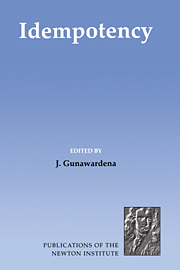Book contents
- Frontmatter
- Contents
- Foreword
- Preface
- List of Participants
- An introduction to idempotency
- Tropical semirings
- Some automata-theoretic aspects of min-max-plus semirings
- The finite power property for rational sets of a free group
- The topological approach to the limitedness problem on distance automata
- Types and dynamics in partially additive categories
- Task resource models and (max, +) automata
- Algebraic system analysis of timed Petri nets
- Ergodic theorems for stochastic operators and discrete event networks.
- Computational issues in recursive stochastic systems
- Periodic points of nonexpansive maps
- A system-theoretic approach for discrete-event control of manufacturing systems
- Idempotent structures in the supervisory control of discrete event systems
- Maxpolynomials and discrete-event dynamic systems
- The Stochastic HJB equation and WKB method
- The Lagrange problem from the point of view of idempotent analysis
- A new differential equation for the dynamics of the Pareto sets
- Duality between probability and optimization
- Maslov optimization theory: topological aspect
- Random particle methods in (max, +) optimization problems
- The geometry of finite dimensional pseudomodules
- A general linear max-plus solution technique
- Axiomatics of thermodynamics and idempotent analysis
- The correspondence principle for idempotent calculus and some computer applications
Preface
Published online by Cambridge University Press: 05 May 2010
- Frontmatter
- Contents
- Foreword
- Preface
- List of Participants
- An introduction to idempotency
- Tropical semirings
- Some automata-theoretic aspects of min-max-plus semirings
- The finite power property for rational sets of a free group
- The topological approach to the limitedness problem on distance automata
- Types and dynamics in partially additive categories
- Task resource models and (max, +) automata
- Algebraic system analysis of timed Petri nets
- Ergodic theorems for stochastic operators and discrete event networks.
- Computational issues in recursive stochastic systems
- Periodic points of nonexpansive maps
- A system-theoretic approach for discrete-event control of manufacturing systems
- Idempotent structures in the supervisory control of discrete event systems
- Maxpolynomials and discrete-event dynamic systems
- The Stochastic HJB equation and WKB method
- The Lagrange problem from the point of view of idempotent analysis
- A new differential equation for the dynamics of the Pareto sets
- Duality between probability and optimization
- Maslov optimization theory: topological aspect
- Random particle methods in (max, +) optimization problems
- The geometry of finite dimensional pseudomodules
- A general linear max-plus solution technique
- Axiomatics of thermodynamics and idempotent analysis
- The correspondence principle for idempotent calculus and some computer applications
Summary
This volume arose out of a workshop on Idempotency that was held at Hewlett-Packard's Basic Research Institute in the Mathematical Sciences (BRIMS) from 3–7 October 1994.
The word idempotency signifies the study of semirings in which the addition operation is idempotent: a + a = a. The best-known example is the max-plus semiring, ℝ U {−∈}, in which addition is defined as max {a, b} and multiplication as a + b, the latter being distributive over the former. Interest in such structures arose in the late 1950s through the observation that certain problems of discrete optimisation could be linearised over suitable idempotent semirings. More recently the subject has established rich connections with automata theory, discrete event systems, nonexpansive mappings, nonlinear partial differential equations, optimisation theory and large deviations. These new developments are the focus of this volume.
The papers brought together here consist of expanded contributions to the BRIMS workshop as well as some invited contributions. The papers were all reviewed, in each case by at least one person who was not associated with the workshop. Although the level of acceptance was more relaxed than for a journal, the reviewing process was conducted seriously. Not all the contributions were accepted and many of those that were have been substantially improved as a result of the reviews. I am grateful to all the reviewers for their time and effort and I regret that, for reasons of confidentiality, it does not seem appropriate to mention their names here.
- Type
- Chapter
- Information
- Idempotency , pp. ix - xPublisher: Cambridge University PressPrint publication year: 1998



